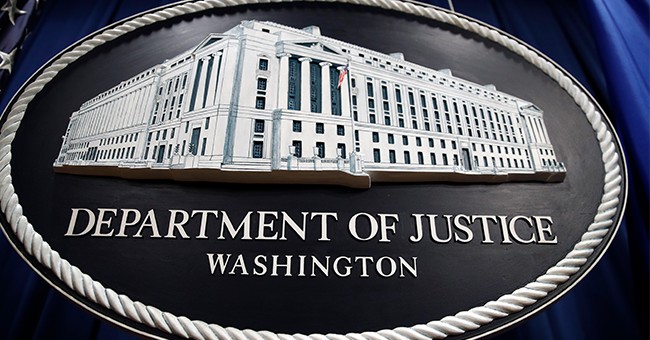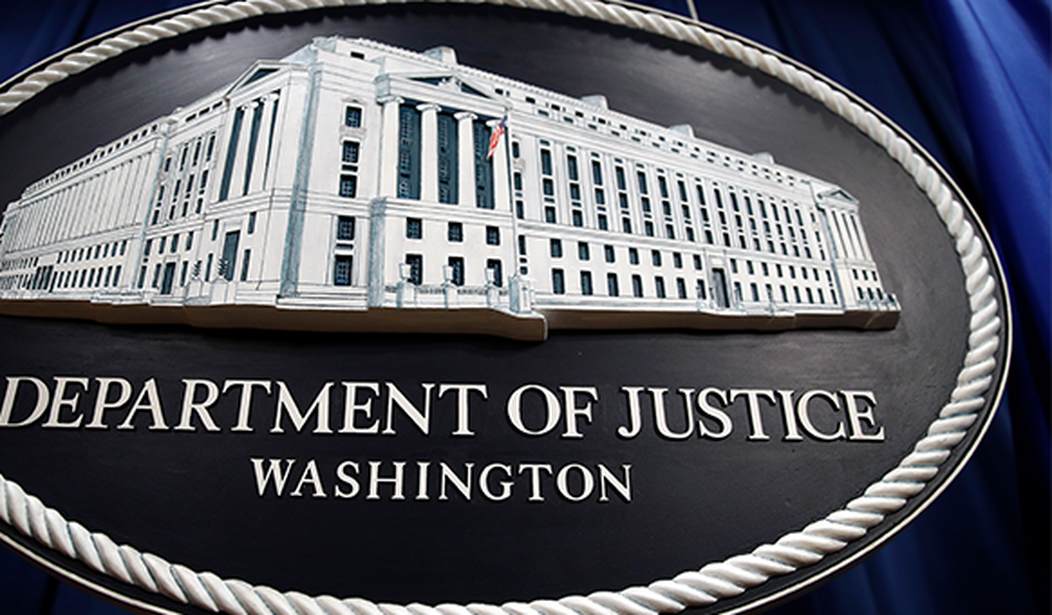
A sign for the Department of Justice hangs in the press briefing room Thursday, April 18, 2019, in Washington, at the Justice Department. Attorney General William Barr was to speak about the release of a redacted version of special counsel Robert Mueller’s report during a news conference. (AP Photo/Patrick Semansky)
In 2017, the US Department of Justice began a crackdown on sanctuary cities. Sanctuary cities are jurisdictions where local authorities either refuse to cooperate with federal immigration agents or where local law enforcement is legally barred from cooperation. The tool the Justice Department used was the massive, $400+ million, Edward Byrne Memorial Justice Assistance Grant Program. With the 2017 grant applications came the requirement that any jurisdiction applying for the grant had to stipulate to three immigration related conditions:
Those conditions required 2017 Byrne grant applicants (1) to certify their willingness to comply with 8 U.S.C. § 1373, which law precludes government entities and officials from prohibiting or restricting the sharing of citizenship or alien‐status information with federal immigration authorities (the “Certification Condition”); (2) to provide assurance that, upon written request of federal immigration authorities, grant recipients would provide notice of an incarcerated alien’s scheduled release date (the “Notice Condition”); and (3) to certify that grant recipients would afford federal authorities access to State‐incarcerated suspected aliens in order for those authorities to determine the aliens’ right to remain in the United States (the “Access Condition”).
Because #OrangeManBad and Resistane Lawfare, the Department of Justice was immediately sued in multiple jurisdictions to enjoin enforcement of the grant requirements. Charitably, the lawsuits were insane. A grantor agency has the right to place terms and conditions on who may apply for grants and it has a right to establish evaluation criteria to be used in selecting grant awardees so long as the requirements are transparent and legal. Enforcing black letter federal law would seem to be the sine qua non of any application for federal law enforcement assistance.
As was to be expected, the Trump administration suffered a string of defeats as San Francisco, Los Angeles, Chicago, Philadelphia, New York City and the states of Connecticut, Massachusetts, New Jersey, New York, Rhode Island, and Virginia all won district court cases barring enforcement of the grant requirements. These bizarre decisions essentially meant that the federal government had to disburse funds to those entities while being forbidden to determine for what purpose they were to be used. (Oddly enough, this is the actual way the federal grants system works as rarely does an agency have enough clout to go to war with the congressional delegation of one or more states. I worked in an agency where a targeted grant program involving millions of dollars was simply dumped in the general revenue fund of a state, reporting requirements were ignored, and the agency was terrified of acting.)
The landscape got no better for the Trump administration on appeal. In the Third, Seventh and Ninth Circuits, the lower court injunctions were upheld. The big prize was the case making its way from the leftist pesthole that is the Southern District of New York to the Second Circuit. Today the Second Circuit handed the Trump administration a resounding victory.
The 2nd Circuit said the plain language of relevant laws make clear that the U.S. attorney general can impose conditions on states and municipalities receiving money.
And it noted that the U.S. Supreme Court has repeatedly observed that the federal government maintains broad power over states when it comes to immigration policies.
In the past two years, federal appeals courts in Chicago, Philadelphia and San Francisco have ruled against the federal government by upholding lower-court injunctions placed on the enforcement of some or all of the challenged conditions.
“While mindful of the respect owed to our sister circuits, we cannot agree that the federal government must be enjoined from imposing the challenged conditions on the federal grants here at issue,” the 2nd Circuit three-judge panel said in a decision written by Judge Reena Raggi.
“These conditions help the federal government enforce national immigration laws and policies supported by successive Democratic and Republican administrations. But more to the authorization point, they ensure that applicants satisfy particular statutory grant requirements imposed by Congress and subject to Attorney General oversight,” the appeals court said.
In what I thought was as ironic as is possible, the court used the notorious Arizona vs. United States decision that forbade Arizona from enforcing federal immigration law to justify requiring them to do so and warded off a “commandeering” challenge while using it:
A commandeering challenge to a federal statute depends on there being pertinent authority “reserved to the States.” In Murphy, there was no question that, but for the challenged federal law, the States’ police power allowed them to decide whether to permit sports gambling within their borders. That conclusion is not so obvious in the immigration context where it is the federal government that holds “broad,” Arizona v. United States, 567 U.S. at 394, and “preeminent” power, Toll v. Moreno, 458 U.S. at 10. Title 8 of the United States Code, commonly known as the Immigration and Nationality Act (“INA”), see 8 U.S.C. § 1101 et seq., is Congress’s “extensive and complex” codification of that power, Arizona v. United States, 567 U.S. at 395.
The Trump administration has made an emergency appeal to the Supreme Court based on the Ninth Circuit case that was handed down on October 31, 2019. I suspect that now that we have a huge conflict between circuits, the Supreme Court will step in and, if recent history is a guide, we will see a 5-4 decision to lift the injunctions in the three rogue circuits…and bring Sonia Sotomayor perilously close to stroking out.













Join the conversation as a VIP Member